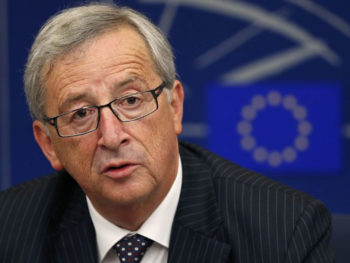
The EU executive will discuss further measures with Italy and Greece in the coming week to help the Mediterranean states deal with irregular migrants, European Commission President Jean-Claude Juncker said on Friday.
Asked at a news conference what, in particular, the Commission might do to help Italy, where arrivals from Libya are up a third on a year ago, Juncker said: “I will see with the Italian prime minister, with the Greek prime minister, during the coming week what further efforts the Commission can line up to relieve Italy and Greece in their difficult struggles.”
He recalled that he had described both countries as “heroic” and said he had discussed the issue on Thursday at a meeting in Berlin with Italian Prime Minister Paolo Gentiloni and leaders of other big EU states which are members of the global G20.
“I said Italy and Greece … cannot be left alone in this refugee crises,” Juncker told reporters in Tallinn, where he was meeting the Estonian government as it takes on the six-month presidency of European Union ministerial councils.
He rejected any suggestion the Union had failed to help the countries where most refugees and migrants are arriving, noting EU funds allocated to Italy and Greece and border guard and other personnel sent to help process those arriving.
The Commission on Thursday threw its weight behind a plea by Italy for fellow EU states to allow rescue boats carrying migrants to dock in their ports.
EU diplomats said they were looking at Italian concerns over how private charities are picking up people just off the Libyan coast. Some see that as encouraging more to take to the sea. The rescue organisations complain of unfair criticism.
About 10,000 people have been rescued over the past three days. Italy has taken in 82,000 people so far this year. Voters dealt a blow to the ruling party in local elections last week, opting for groups promising a tougher line on immigration.
The Commission has signalled readiness to give Italy more cash to help with increased arrivals, though officials and diplomats in Brussels are sceptical there would be any swift agreement for other EU states to take in the private boats.
